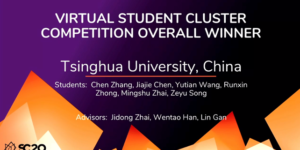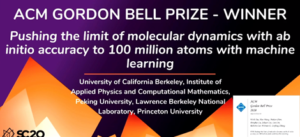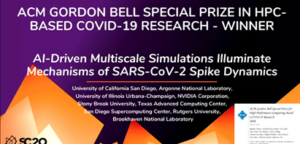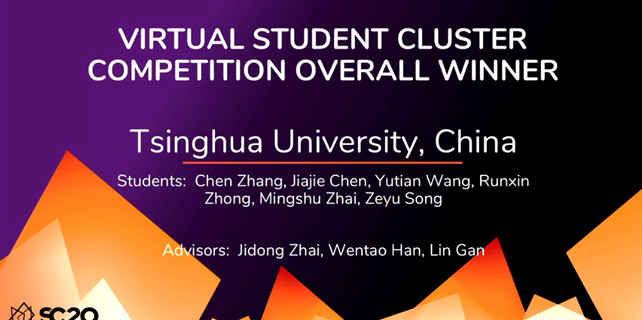
Teams entered in this year’s SC Student Cluster Competition
It was awards day at Virtual SC20, and among the most coveted and closely watched of them ate annual SC Student Cluster Competition and the ACM Gordon Bell Prize.
This year’s cluster competition winner: Tsinghaua University, China. The same team won the competition for the highest LINPACK benchmark performance.
Now in its 14th year, this year’s Student Cluster Competition was comprised of 114 students on 19 teams from six countries 14th year. The competition is designed to showcase students’ skills, testing their ability to optimize use of HPC resources in a constrained environment. The competition culminates in the presentation of two awards.. They competed for 72 hours last week, and it included a range of activities, from teams building a physical cluster and competing in-person to building a virtual cluster in the Azure cloud. Microsoft sponsored the majority of the cloud resources for teams to train and compete.
The teams in aggregate used $61,000 of their combined $70,000 budget – each team was given a $3,200 initial budget followed by a “surprise” $500 boost 12 hours before the competition’s end. The peak team spending rate was achieved by the winning team, Tsinghua University, which used $540/hr at one point in the competition, according to SC20.
In addition, the afternoon’s award ceremonies included presentation of the annual Association for Computing Machinery Gordon Bell Prize for outstanding achievement in HPC. The award tracks progress in parallel computing, with emphasis on innovation in applying HPC to applications in science, engineering, and large-scale data analytics. Prizes may be awarded for peak performance or special achievements in scalability and time-to-solution on important science and engineering problems. Financial support of the $10,000 award is provided by Gordon Bell, a pioneer in high-performance and parallel computing.

The year, the ACM named a nine-member team, drawn from Chinese and American institutions, for their project, “Pushing the limit of molecular dynamics with ab initio accuracy to 100 million atoms with machine learning.”
Winning team members include Weile Jia, University of California, Berkeley; Han Wang, Institute of Applied Physics and Computational Mathematics (Beijing, China); Mohan Chen, Peking University; Denghui Lu, Peking University; Jiduan Liu, Peking University; Lin Lin, University of California, Berkeley and Lawrence Berkeley National Laboratory; Roberto Car, Princeton University; Weinan E, Princeton University; and Linfeng Zhang, Princeton University.
I n addition, the ACM awarded a special Gordon Bell Special Prize for HPC-Based COVID-19 Research to a 12-member team for their project “AI-Driven Multiscale Simulations Illuminate Mechanisms of SARS-CoV-2 Spike Dynamics.”
n addition, the ACM awarded a special Gordon Bell Special Prize for HPC-Based COVID-19 Research to a 12-member team for their project “AI-Driven Multiscale Simulations Illuminate Mechanisms of SARS-CoV-2 Spike Dynamics.”
 Winning team members include Rommie Amaro, University of California, San Diego; Arvind Ramanathan, Argonne National Laboratory; Tom Gibbs, NVIDIA; John Stone, University of Illinois at Urbana-Champaign; Jim Phillips, University of Illinois at Urbana-Champaign; Lillian Chong, University of Pittsburgh; Lorenzo Casalino, University of California, San Diego; Abigail Dommer, University of California, San Diego; David Hardy, University of Illinois at Urbana-Champaign; Julio Maia, University of Illinois at Urbana-Champaign; Thorsten Kurth, NVIDIA; and Shantenu Jha, Rutgers University.
Winning team members include Rommie Amaro, University of California, San Diego; Arvind Ramanathan, Argonne National Laboratory; Tom Gibbs, NVIDIA; John Stone, University of Illinois at Urbana-Champaign; Jim Phillips, University of Illinois at Urbana-Champaign; Lillian Chong, University of Pittsburgh; Lorenzo Casalino, University of California, San Diego; Abigail Dommer, University of California, San Diego; David Hardy, University of Illinois at Urbana-Champaign; Julio Maia, University of Illinois at Urbana-Champaign; Thorsten Kurth, NVIDIA; and Shantenu Jha, Rutgers University.




